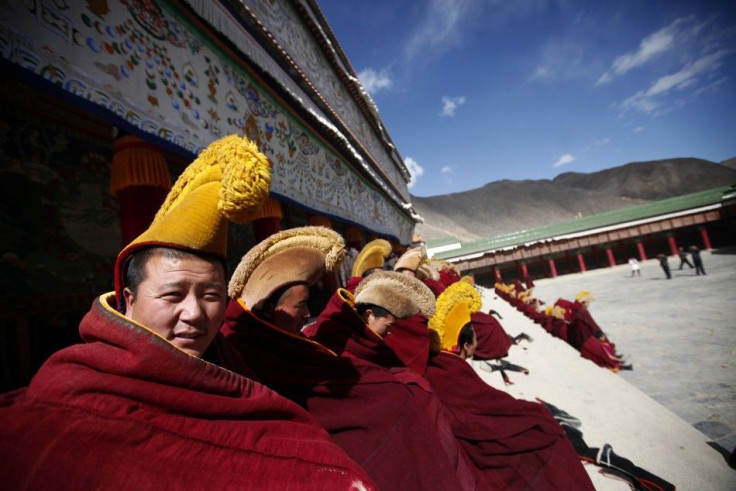China's Government Wants To Test Tibetan Monks On Communist Party Doctrine

Chinese officials are insisting that Tibet’s Buddhist monks and nuns dedicate themselves to the practices of the Communist Party as much as they focus on their religious practices. The Communist Party official for the Tibet Autonomous Region said on Wednesday that monasteries should become centers for “patriotism” to enforce communist ideologies.
This is not the first time China has imposed communist ideals and propaganda on Tibet and Buddhist followers in the region. The officially atheist government has had a history of denouncing the Dalai Lama, the exiled spiritual leader, and marginalizing Tibetan people and their culture. Tension remains, as self-immolations of Tibetans, signs of extreme protest against the Chinese government, still frequently occur.
Despite the frequent clashes between Tibetans and China’s central government, on Wednesday, Chen Quangbo, the Communist Party boss for the region, said he hopes Tibet’s roughly 50,000 monks can see the central government as “friends.”
“Let the monks and nuns in the temples and monasteries have a personal feeling of the party and government’s care and warmth; let them feel the party’s benevolence, listen to the party’s words and follow the party’s path,” Chen wrote in the Communist Party magazine Qiushi.
Cheng went on to say the central rules and maxims that govern the Communist Party and the country should be embodied within monasteries. “Monks and nuns should not have to go out of their temples or monasteries to understand the party and government’s policies and social progress, or Tibet’s peace, stability and good fortune, so as to be guided to follow a path of reverting scientific culture.”
In order to achieve this, Chen said monasteries will need to have “national flags, telephone connections, newspapers and reading rooms” — a far cry from the simple-living traditions of Buddhists.
According to a report by the Guardian, Chen wrote in the People’s Daily newspaper that the Communist Party would enforce “assessment activities” on Tibetan monks to test “patriotism.”
Alistair Currie, communications manager of the U.K. advocacy group Free Tibet, says the announcement of increased government involvement with Tibetan livelihoods has been met with incredulity.
“There is no doubt [changes] will be greeted with skepticism and a sense of anger,” Currie said via telephone. He explained that Tibetan monks often have fallen victim to the “soft rhetoric” posed by the government.
“Tibetans are very aware of the pressure they are under,” Currie said of Tibetans who have long been under scrutiny by the government. And while the renewed attention on monasteries won’t be welcome, Tibetan thought leaders won’t likely express Communist Party doctrine any time soon.
“They will effectively see nothing at all,” Currie said, adding that the new government pressure will instead “generate grief, resentment and anger among Tibetans.”
And while Currie said China likely will continue to attempt to “manipulate Tibetan faith,” Tibetans historically have been steadfast in their beliefs. “It has never worked,” he said.
© Copyright IBTimes 2024. All rights reserved.






















